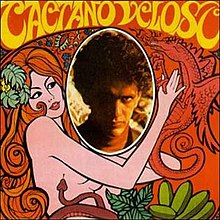Caetano Veloso (1968 album)
| Caetano Veloso | ||||
|---|---|---|---|---|
 |
||||
| Studio album by Caetano Veloso | ||||
| Released | 1968 | |||
| Genre | Tropicália, psychedelic rock | |||
| Length | 34:54 | |||
| Label | Phillips | |||
| Producer | Manuel Barenbein | |||
| Caetano Veloso chronology | ||||
|
||||
| Professional ratings | |
|---|---|
| Review scores | |
| Source | Rating |
| Allmusic | |
| Pitchfork | 9.4/10 |
Caetano Veloso is the debut solo album by the artist of the same name, released in Brazil in 1968. He had released Domingo the year before in collaboration with Gal Costa. It was one of the first Tropicália efforts, and features arrangements by Júlio Medaglia, Damiano Cozzella, and Sandino Hohagen, as well as an eclectic assortment of influences, demonstrating the "antropofagia" (artistic cannibalism) of the Tropicália movement. Sounds from psychedelia, rock, pop, Indian music, bossa nova, Bahian music and other genres appear on the album. It includes the hit songs "Alegria, Alegria", "Tropicália", and "Soy Loco Por Tí, América".
Recorded to capitalize on the success of the forward-looking "Alegria, Alegria" at the TV Record Festival, the album mostly continued in the new direction in which Caetano and his fellow tropicalistas (though that term had not yet been employed to describe them) wanted to take Brazilian popular music. Where his debut Domingo had been primarily based on more traditional Brazilian musical styles such as bossa nova, his second album relied heavily on sounds and instrumentation more common to rock and roll and psychedelia.
...
Wikipedia
